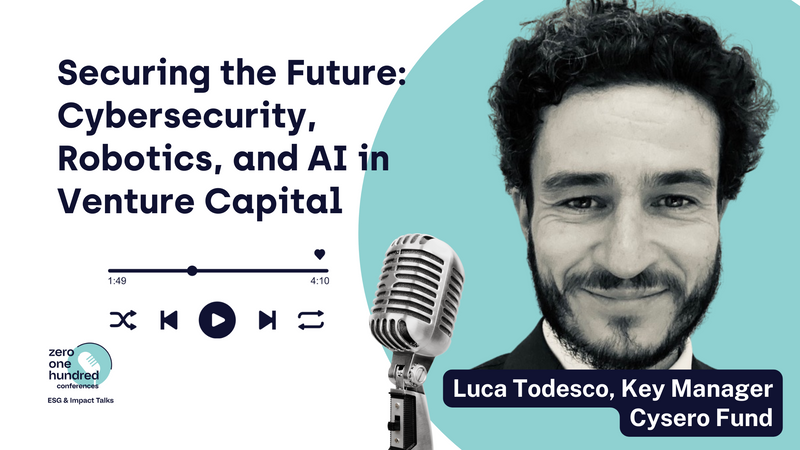In this episode of 0100 ESG and Impact Talks, we sit down with Luca Todesco, Key Manager at Cysero Fund, to explore the transformative impact of cybersecurity, robotics, and AI in venture capital. With a unique background spanning finance, consulting, and tech investing, Luca shares his insights on navigating challenges, seizing opportunities in the Italian deep-tech ecosystem, and the critical role these technologies play in shaping our future. Tune in for an engaging discussion on innovation, regulation, and the convergence of cutting-edge sectors.

Let’s start with the basics—what does Cysero mean?
Of course. Thanks for having me, Laura. Cysero, as the name might suggest—but doesn’t always make clear—is an Italian VC fund dedicated to three very specific and deep-tech verticals:
Cybersecurity
Robotics
Artificial Intelligence (AI)
When we launched Cysero in 2020, we thought these were interesting and hot topics. Over the past four years, their importance has only grown, proving us fortunate to work in such a relevant space.
Our LPs are all prominent entrepreneurs in Italy, with strong industrial backgrounds—a natural fit for robotics. Currently, we’re making some fascinating investments and exploring diverse topics. For instance, in robotics, our portfolio includes humanoid robots. While they may not be dancing, they are truly autonomous—not remotely controlled. We also have active exoskeletons, high-capacity drones, encryption technologies, and cyber applications like XDR.
We’re wrapping up the first vintage of our fund, which has been quite successful, including one exit. Now, we’re preparing to launch the second vintage. The Italian deep-tech space presents exciting opportunities for a few reasons. First, valuations in Italy are very competitive—some might say undervalued. While there are challenges tied to this, it also offers significant arbitrage potential for European and U.S. investors.
Why are valuations in Italy so competitive?
Italy is a developed country with a strong industrial base but has a relatively small and illiquid VC market. It’s not known for having the most transparent or efficient legal systems, which makes some investors cautious.
However, Italy is home to four of the top 100 global universities for engineering and has a rich tradition of innovation—not just in cars and fashion but also in mechanics, mechatronics, robotics, and electronics. Moreover, the cost of a skilled engineer in Italy is a fraction of what you’d pay in countries like Switzerland, the UK, or the U.S. This combination of exceptional human capital and competitive valuations is why we see more foreign investors exploring opportunities in Italy.
For our second vintage, we aim to support both Italian companies and those founded by Italian entrepreneurs abroad. We already have portfolio companies in Silicon Valley, Dublin, and Berlin, and we’re helping them connect with European markets and investors.
What are the main challenges in investing in cybersecurity, not just in Italy but across Europe?
Europe offers great promise but also significant challenges. First, there’s fragmentation. We have 27 countries, each with its own government, laws, cultures, and sometimes languages. Yet, our infrastructures are deeply interconnected. For example, a cyberattack in one country can ripple across others due to shared energy grids or other systems.
Second, Europe’s regulatory environment is both a strength and a challenge. Initiatives like GDPR ensure privacy and data protection but also add complexity, cost, and slower implementation for cybersecurity solutions.
Lastly, Europe is a geopolitical battleground for cyber threats, ranging from misinformation and data manipulation to state-sponsored attacks. These challenges demand robust collaboration and innovation in cybersecurity.
Cybersecurity encompasses various fields, such as defense, intelligence, and data protection. How do you define and prioritize these areas?
At its core, cybersecurity involves protecting networks, systems, and data from unauthorized access and attacks. It’s about ensuring the confidentiality, integrity, and availability of information—commonly called the CIA triad.
Within cybersecurity, we focus on business-to-business (B2B) applications rather than defense. While cyber defense is critical, it involves unique challenges such as security clearances, national regulations, and dependency on a few large clients, often governmental. By contrast, cybersecurity has broader use cases and fewer barriers, making it more appealing for VC investment.
Let’s talk about the intersection of cybersecurity, robotics, and AI. How do these fields converge in your investment strategy?
Robotics and AI are transformative technologies entering everyday life, and their security is paramount. For instance, we’re invested in Oversonic, a leading robotics company. Their humanoid robots work alongside humans in industrial settings, handling tools and operating autonomously. Without cybersecurity, such innovations pose significant risks.
Similarly, AI systems need robust security to prevent misuse or unintended actions. As robotics and AI capabilities grow, so do their vulnerabilities. Our strategy reflects this convergence: cybersecurity safeguards robotics and AI, making them viable and safe for widespread adoption.
What role does regulation play in shaping the cybersecurity landscape?
Regulation is crucial. For instance, Europe’s upcoming NIS 2 directive will require companies to maintain baseline cybersecurity standards, not just for themselves but for their suppliers. This creates significant opportunities in compliance and related markets.
While regulation can slow innovation, it’s necessary to ensure security and build trust. Europe’s focus on regulation gives it a unique edge, even if it means navigating trade-offs between speed and safety.
Before we wrap up, is there a cybersecurity innovation you think has significantly impacted our daily lives?
Absolutely. I’d highlight three:
Zero-Trust Architecture: This approach ensures no device or user is trusted by default, requiring additional verification layers like multifactor authentication.
Passwordless Authentication: Technologies like iris, fingerprint, and facial recognition enhance security while being user-friendly.
AI in Cybersecurity: Modern cybersecurity tools now use AI to detect patterns, identify threats, and counter cyberattacks in real time, often without users even noticing.
These advancements protect our digital infrastructure, which underpins nearly every aspect of modern life.

